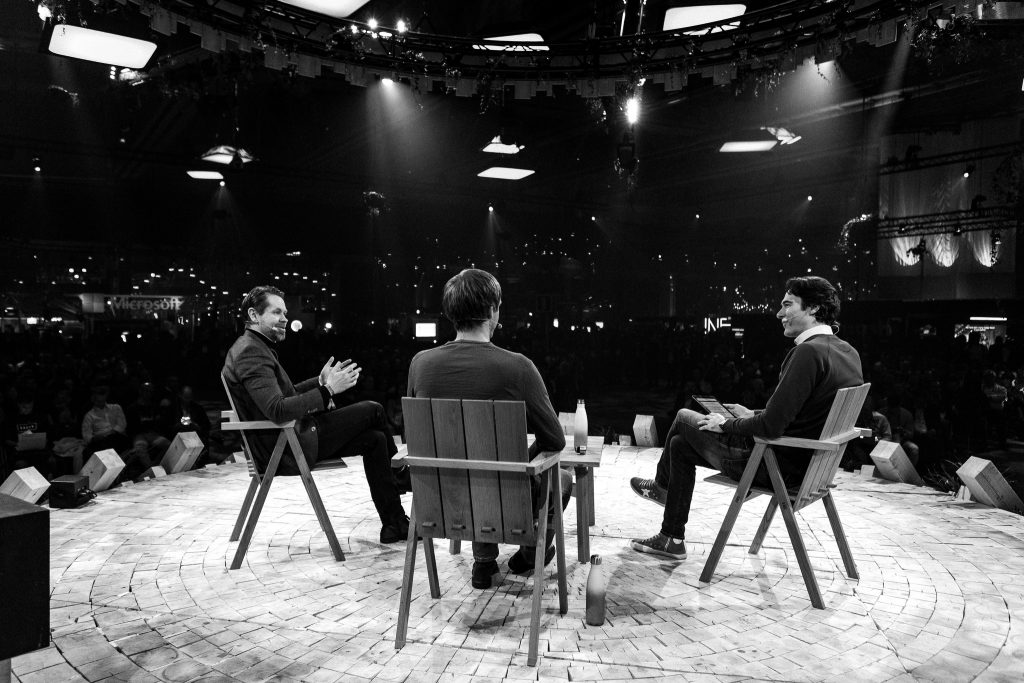Gaming made a massive comeback at Slush 2018, where game industry royalty gathered to dissect the state of gaming. Nobody has a clearer crystal ball to predict the future of gaming than Tencent, Niantic, Wafa Games plus some of the most successful game studios in the world. In case you missed the action, here are the highlights from Slush.
BOSS FIGHT 1: SCIENCE VS CREATIVITY


One of the most contested topics in games is the balance between data science and creative art as a key to global success. Can Kathy Gong from Wafa Games, Roberta Lucca from Bossa Studios and Martial Valery from Oh Bibi find an answer to this chicken and egg situation: which is more important in games, science or creativity?
Martial Valery is the co-founder of French mobile gaming studio Oh BiBi, best known for hot racing games like SUP Multiplayer Racing, LoL KART and Motor World Car Factory, as well as their pro shooter FRAG.
Valery opens the game by pointing out that although their games are highly data driven, if they only looked at data, they would never have made a first view shooter, which proved to be hugely successful.
Roberta Lucca, the co-founder of Bossa Studios, could not agree more. Lucca knows that you can only build revolutionary – instead of just evolutionary – games through creative processes like internal game jams.
Pros and cons of data
A different approach comes from Kathy Gong, the founder & CEO of Chinese Wafa Games, known for their innovative gaming experiences and novel gameplays. Gong sees this as a direct result from profiling as a tech-driven company.
Not surprising then – and being a professional chess player herself – Kathy Gong puts her trust in constant A/B testing to ensure the storytelling is seductive to gamers.
Martial Valery, however, points out that the seduction can be lost if you only look at data. You are much more likely to copycat and follow current trends. Market data makes you design games that people wanted a year ago, when you should be making games for the future.
Even Kathy Gong must agree to this. Using the chess metaphor: logic makes a professional, but it takes creativity and curiosity to make a master.
Global gaming communities
On the topic of global game business, Kathy Gong emphasizes using cultural data and insight to create universally successful games with minimal localization. Values should be mutual cross all cultures, just as humanity is universal.
Marcial Valery agrees that science is universal, but to him, creativity is cultural. Roberta Lucca nods and credits her diverse game development team with over 20 nationalities for their high density of different viewpoints.
Gamers are also changing. Roberta Lucca sees people underestimating the power of internet and games to young generations. For them, there is no distinguishing between online and offline, they are fluid.
Martial Valery sees the future of games in social innovation. With a social recipe, meaningful games will increase people’s happiness. To wrap things up, Roberta Lucca encourages all game developers to infiltrate the platforms and engage with the audience more.
As usual, the panel did not answer the initial question. Oh well…next!
BOSS FIGHT 2: WHAT’S COOKING IN AR?


The snidely titled discussion ‘Weren’t We Supposed to Live in an Augmented Reality by 2018?’ was held between Ross Finman, AR Research Lead at Niantic and Thor Fridriksson, CEO of Teatime Games.
Their excruciating task is to discuss the constantly evolving augmented reality space to reveal what is really going on with the business. Let’s find out.
Firstly, both Finman and Fridriksson agree that now AR is all about promise and vision. People must believe what it can be because we are not there yet.
Even though devices are the biggest problem in fully utilizing AR, it is still ahead of VR, because AR can be reasonably well used with mobile phones. It is not reliant on headsets like VR, although AR headsets will come later. Further barriers are the massive data layer required, but also social acceptability.
AR will enhance the world
Thor Fridriksson would like to make AR a truly social experiment. AR is not just about augmenting reality but yourself as well. The biggest current user of AR technology is Snapchat, with the main purpose of augmenting yourself with a variety of lenses and filters.
Fridriksson sees in the near future video chats, where we play games with lenses. Shortly, gaming will be the biggest user of AR. AR fulfills the fantasy, like interaction with Pokémon characters. Further use cases will be instructions – think of IKEA manuals in AR – and visualizations in industrial or education settings.
Ross Finman from Niantic nods and agrees that AR or MR, mixed reality, will soon influence everyone’s life. But he would not get too tied up in terminology. AR or MR, it’s all the same. You can even call it magical reality! That would fit nicely with Niantic’s upcoming Harry Potter game.
On a more serious note, Finman addresses the problem of slowly developing devices. Google glasses had big expectations but failed to deliver. He sees Google winning the device game in the end, though. Glasses will be mainstream as soon as soon the technology is ready and people want to wear them.
So, what do they want to see next? Ross Finman is eagerly waiting for an AR ad blocker and overall more personalized experiences, whereas Thor Fridriksson wishlist includes face recognition pared with LinkedIn.
We must wait and see.
BOSS FIGHT 3: FUTURE OF GAMES AND PLATFORMS

Photo: Sami Välikangas @Slush18
This wasn’t actually a joint discussion, but two separate interviews with Kristian Segerstråle from Playfish and Dan Brody from Tencent. However, the topics fit nicely together, so I have written it as a dialogue.
Kristian Segerstråle can teach us a lesson or two about building category-defining game startups. Playfish made a series of highly successful Facebook games before being acquired by EA.
So where did the inspiration for cross-platform gaming experience came from? Segerstråle recalls it as a combination of ambition and frustration. He was very frustrated about the state of mobile gaming in 2007, but on the other hand, he was very inspired by Nintendo Wii and Facebook’s connectivity with friends.
Actually, Segerståle prefers the term post-platform, where people be able to play together regardless of their native platform.
In this interview, Tencent’s Dan Brody echoed very similar themes. Gaming is finally getting mainstream and it’s cool to be a gamer. Asia’s prominent comic culture is finally fully extending to the Western culture. As the world’s largest gaming company and the majority stakeholder of Supercell, Tencent has done nicely with this union.
Emerging trends in games
Both Kristian Segerstråle and Dan Brody find mobile esports very interesting. As Brody points out, the League of Legends World Championship is the most watched sports event in history.
For Segerstråle the coolest thing right now is cross-platform games, but also voice gaming. Dan Brody’s current top game modes are MOBA and battle royale. New genres build new layers of revenue, which is good for the whole gaming ecosystem.
Brody thinks that mobile games are having a hard time getting distribution. In fact, so many have gone back to PC, that there is a renaissance of PC gaming.
In addition, games as a service (GaaS) business models are making their way from Asia to Western markets. Another current trend, self-publishing, is still growing.
Segerstråle and Brody see VR and AR as the next new platform in gaming and are exciting when that happens. But as Segerstråle points out, the hardware is still too young, so the breakthrough might still take 5-10 years. However, location based mobile games are already proving they can deliver the critical mass of players. Here IP is a big part of the success.
Tips for game developers
Here is a joint Segerstråle/Brody checklist for game developers: What is awesome? What do you want to play? What is feasible? Where is the industry going? Who is the target audience? How can you switch platforms between PC and mobile?
It is becoming more and more important to build communities, where people come together online and share common experiences. Epic Games with their megahit Fortnite and Discord have further increased the fragmentation.
Lastly, game development is a journey, where you must do ruthless prioritization with your time and efforts. You must have the right people and the right traction with the gaming community. But the most important thing is building games that you love.
So there you have it folks: 2019 is looking peachy for games and gamers!
